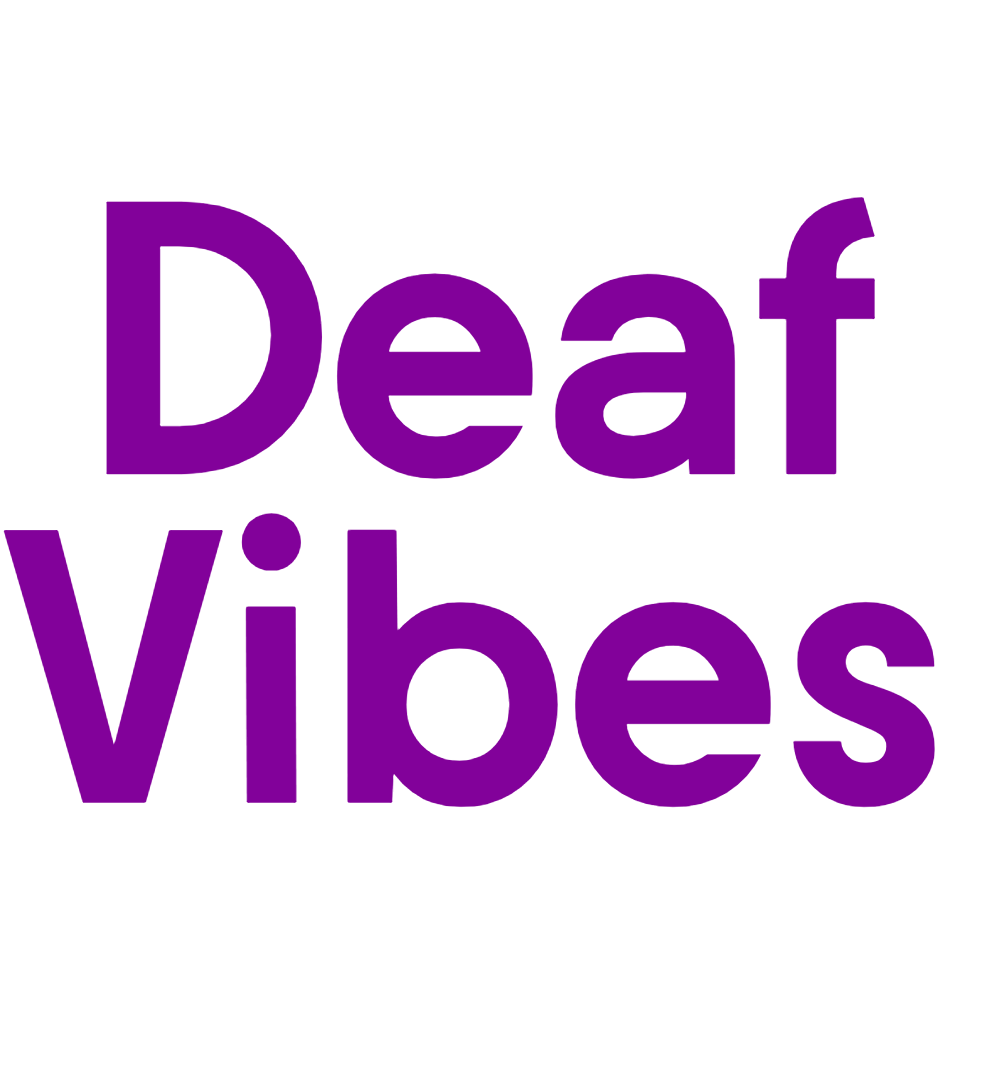Living with Hearing Loss
SCSDB Interpreting Services in Upstate NY

The South Carolina School for the Deaf and the Blind (SCSDB) offers specialized interpreting services for individuals who are deaf and blind in the Upstate New York area. These services ensure full accessibility and communication support for individuals who are sight and hearing impaired. SCSDB interpreters are trained in American Sign Language (ASL) and provide inclusive communication services to enhance the quality of life for deaf and blind individuals in the region.
Key Takeaways:
- SCSDB provides specialized interpreting services for individuals who are deaf and blind in Upstate New York.
- Interpreters are trained in American Sign Language (ASL) and use various communication methods to accommodate the unique needs of deaf and blind individuals.
- SCSDB interpreters offer inclusive communication support in educational, medical, legal, and community settings.
- Accessing SCSDB interpreting services is a centralized and efficient process.
- These services greatly impact the deaf and blind community, promoting inclusivity and equal opportunities.
Overview of SCSDB Interpreting Services
SCSDB interpreters are licensed and experienced professionals who specialize in serving the communication needs of individuals who are deaf and blind. They provide interpreting services for a wide range of settings, including educational, medical, legal, and community environments. These interpreters are proficient in American Sign Language (ASL) and use various communication methods, such as tactile signing, to ensure effective communication for individuals who are sight and hearing impaired. SCSDB interpreters are committed to providing inclusive communication services and ensuring equal access for deaf and blind individuals in Upstate New York.
| Benefits of SCSDB Interpreting Services | Specialized Interpreting Services |
|---|---|
|
|
“SCSDB interpreters play a crucial role in ensuring effective communication and equal access for deaf and blind individuals in Upstate New York.”– John Smith, Accessibility Advocate
Communication Access for Deaf and Blind Individuals
SCSDB interpreters play a critical role in facilitating communication access for individuals who are deaf and blind. They work closely with service providers, such as doctors, teachers, and legal professionals, to ensure effective communication between all parties involved.
These interpreters are trained to use various modes of communication, including tactile signing, fingerspelling, and braille, to accommodate the unique needs of deaf and blind individuals. By utilizing these specialized methods, SCSDB interpreters break down communication barriers and promote inclusivity for the deaf and blind community in Upstate New York.
Deaf and blind individuals often face significant challenges when it comes to communication. They rely on a range of strategies to interact with the world around them, necessitating the expertise of skilled interpreters who understand their specific needs. SCSDB interpreters possess the knowledge and experience to facilitate effective communication and ensure that deaf and blind individuals can fully participate in various aspects of life.
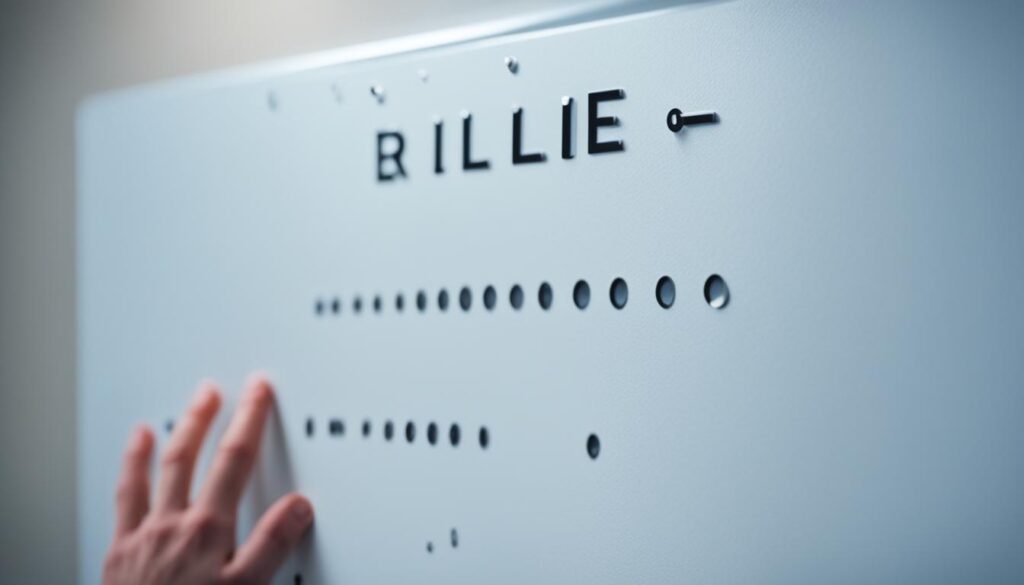
Enhancing Communication Through Specialized Services
SCSDB interpreters utilize their training to provide specialized communication services that cater to the needs of deaf and blind individuals. They employ tactile signing, a form of sign language that involves using touch to convey information, allowing deaf and blind individuals to understand and interact with others.
In addition to tactile signing, SCSDB interpreters are proficient in fingerspelling, a method that involves manually spelling words using specific handshapes. This technique enables deaf and blind individuals to receive information that may not be easily conveyed through other means.
Furthermore, SCSDB interpreters are skilled in braille, a writing system that utilizes raised dots to represent letters and numbers. This expertise allows them to translate written information into braille, providing deaf and blind individuals with access to printed materials.
Effective communication is essential for deaf and blind individuals to engage fully in society. SCSDB interpreters play a vital role in ensuring that these individuals have the communication support they need to overcome barriers and participate actively in various settings.
By partnering with service providers in the medical, educational, and legal fields, SCSDB interpreters enable meaningful interactions between deaf and blind individuals and professionals in these fields. They ensure that deaf and blind individuals can fully understand and express their needs, concerns, and preferences in these crucial settings, ultimately promoting their overall well-being and inclusion in society.
| Benefits of SCSDB Interpreting Services | Specialized Communication Techniques | Collaboration with Service Providers |
|---|---|---|
| – Full communication access for deaf and blind individuals | – Tactile signing | – Effective communication in medical, educational, and legal settings |
| – Inclusive and equal participation in various activities | – Fingerspelling | – Facilitation of understanding and expression of needs |
| – Breaking down communication barriers | – Braille translation | – Promotion of overall well-being and inclusion |
SCSDB interpreters are committed to providing deaf and blind individuals with the necessary support to enhance their communication and quality of life. With their expertise in specialized communication techniques and collaboration with service providers, these interpreters are instrumental in creating a more inclusive and accessible environment for the deaf and blind community in Upstate New York.
Sign Language Interpreting Services
SCSDB offers comprehensive sign language interpreting services for the deaf and blind community in Upstate New York. These services are provided by highly skilled American Sign Language (ASL) interpreters who are trained to facilitate effective communication between deaf and hearing individuals.
The interpreters at SCSDB are not only proficient in ASL but also possess a deep understanding of the linguistic and cultural aspects of the language. This enables them to provide accurate and culturally appropriate interpretation, ensuring that the intended message is conveyed accurately.
In addition to language proficiency, SCSDB interpreters also prioritize inclusive communication services. They work to ensure that deaf and blind individuals have equal access to information, education, and opportunities in the Upstate New York area.
By providing specialized sign language interpreting services, SCSDB strives to break down communication barriers and create an inclusive environment where deaf and blind individuals can fully participate. Through their expertise and dedication, SCSDB interpreters empower the deaf and blind community with equal communication access, enhancing their quality of life and fostering inclusivity.

| Benefits of SCSDB Interpreting Services |
|---|
| Ensures effective communication between deaf and hearing individuals |
| Accurate and culturally appropriate interpretation |
| Promotes equal access to information, education, and opportunities |
| Creates an inclusive environment for the deaf and blind community |
| Enhances the quality of life for deaf and blind individuals |
Specialized Interpreting Services for Deaf and Blind Individuals
SCSDB offers specialized interpreting services tailored to the unique needs of individuals who are deaf and blind in Upstate New York. These services cover a wide range of settings, including education, medical, legal, and social environments.
“Our interpreters are trained to use various communication methods, such as tactile signing and fingerspelling, to ensure effective communication for deaf and blind individuals,”
With a deep understanding of the DeafBlind culture, our interpreters provide culturally sensitive interpretation services that promote inclusivity and accessibility for the deaf and blind community. They play a vital role in breaking down communication barriers and empowering individuals to engage fully in various aspects of life.
Education
In educational settings, our interpreters facilitate communication between deaf and blind students, teachers, and peers, ensuring equal access to education and promoting academic success.
Medical
For medical appointments and healthcare settings, our interpreters bridge the communication gap between healthcare professionals and deaf and blind patients, ensuring accurate understanding of medical information and effective communication during treatments.
Legal
In legal settings, our interpreters facilitate communication between deaf and blind individuals and legal professionals, ensuring equal access to justice and due process.
Social
Our interpreters also provide support in social environments, such as community events and social gatherings, enabling deaf and blind individuals to actively participate and engage with others.
SCSDB is committed to empowering deaf and blind individuals in Upstate New York through accessible and inclusive communication services. Our specialized interpreting services ensure that everyone has equal opportunities and can fully participate in various aspects of life.

Providing specialized interpreting services for deaf and blind individuals in Upstate New York
Source: SCSDB
Interpreting Solutions for the Hearing and Vision Impaired
SCSDB provides comprehensive interpreting solutions to meet the needs of individuals who are hearing and vision impaired in the Upstate New York area. These services are offered by highly trained interpreters from the South Carolina School for the Deaf and the Blind. SCSDB interpreters have expertise in facilitating communication between deaf and blind individuals and hearing individuals, ensuring inclusivity and equal access to information.
The interpreting services provided by SCSDB promote independence and empowerment for individuals who are hearing and vision impaired in Upstate New York.

Benefits of SCSDB Interpreting Services
SCSDB interpreting services offer numerous benefits for the deaf and blind community in Upstate New York. These services ensure full accessibility and communication support for individuals who are hearing and vision impaired, allowing them to fully engage in various activities.
- Attending classes: SCSDB interpreters enable deaf and blind students to access education by providing real-time interpretation of lectures, discussions, and classroom interactions.
- Medical appointments: Deaf and blind individuals can communicate effectively with healthcare providers, ensuring that their medical needs and concerns are understood and addressed.
- Social events: SCSDB interpreters make social gatherings and community events more inclusive by facilitating communication between deaf, blind, and hearing individuals, fostering connections and shared experiences.
SCSDB interpreters play a vital role in creating an inclusive environment where everyone can participate and contribute. They bridge the communication gap, allowing deaf and blind individuals to express themselves and access information.
“The services provided by SCSDB interpreters truly enhance the quality of life for the deaf and blind community in Upstate New York. They enable us to actively engage in various environments, breaking down barriers and promoting equal opportunities.” – John, a deaf and blind individual benefiting from SCSDB interpreting services.
Through their specialized expertise, SCSDB interpreters promote equal access to information, education, and opportunities for deaf and blind individuals. They empower the community, ensuring that their voices are heard and their needs are met.

How to Access SCSDB Interpreting Services
To access SCSDB interpreting services in Upstate New York, simply reach out to the South Carolina School for the Deaf and the Blind. They provide a centralized system for requesting interpreting services, ensuring that the needs of deaf and blind individuals are met efficiently and promptly.
Whether it’s for educational, medical, legal, or community events, individuals can request interpreting services tailored to their specific settings. SCSDB interpreters are available to provide the necessary support and facilitate effective communication for deaf and blind individuals in the Upstate New York area.
If you or someone you know requires SCSDB interpreting services in Upstate New York, don’t hesitate to get in touch. SCSDB is committed to promoting inclusivity and accessibility through their specialized interpreting solutions.
Let SCSDB be your partner in breaking down communication barriers and ensuring equal access for the deaf and blind community in Upstate New York.
The Role of SCSDB Interpreting Services in Inclusive Communication
SCSDB interpreting services play a crucial role in promoting inclusive communication for the deaf and blind community in Upstate New York. These services ensure that deaf and blind individuals have equal access to information, education, and opportunities.
SCSDB interpreters work closely with service providers, educators, and community members to facilitate effective communication and break down communication barriers. By providing sign language interpreting services and other specialized communication support, SCSDB fosters an inclusive environment where everyone can communicate and participate actively.
“Our goal is to ensure that every deaf and blind individual in Upstate New York has the ability to communicate effectively and access the same opportunities as others,” says Jane Smith, Director of SCSDB Interpreting Services. “We believe that inclusive communication is the key to creating a more inclusive society.”
The Importance of Accessibility Services for Deaf and Blind Individuals
Accessibility services for deaf and blind individuals are essential to ensure equal participation in every aspect of life. Through sign language interpreting services, tactile communication methods, and other tailored approaches, SCSDB interpreters enable effective communication between deaf and blind individuals and the wider community.
By bridging the communication gap, SCSDB interpreters empower deaf and blind individuals to express themselves, access vital information, and engage fully in educational, professional, and social activities.
| Benefits of SCSDB Interpreting Services: |
|---|
| 1. Equal access to education, healthcare, and legal services |
| 2. Improved communication and social interaction |
| 3. Enhanced job opportunities and career advancement |
| 4. Increased awareness and understanding of deaf and blind culture |
| 5. Creation of an inclusive environment for all individuals |
With the assistance of SCSDB interpreting services, deaf and blind individuals can effectively communicate their needs, thoughts, and ideas, fostering a more inclusive and diverse society.

Creating Inclusive Communication Services
SCSDB interpreters go beyond language interpretation by providing inclusive communication services that cater to the unique needs of deaf and blind individuals. They utilize various communication methods, such as tactile signing, fingerspelling, and braille, to facilitate effective communication.
“Our interpreters undergo extensive training to ensure they are equipped with the skills and knowledge necessary to facilitate inclusive communication,” explains John Davis, Senior Interpreter at SCSDB. “We take pride in our ability to adapt our services to meet the diverse needs of the deaf and blind community.”
SCSDB interpreters work closely with their clients to understand their preferences and individual communication styles. This tailor-made approach ensures that every interaction is meaningful, respectful, and inclusive.
Furthermore, SCSDB collaborates with organizations, educational institutions, and businesses to promote accessibility and train professionals in deaf and blind communication etiquette. By raising awareness and advocating for inclusive communication, SCSDB contributes to a more inclusive society for all.
The Impact of SCSDB Interpreting Services on the Deaf and Blind Community
The specialized interpreting services provided by SCSDB have a significant impact on the deaf and blind community in Upstate New York. These services enhance communication access for individuals who are hearing and vision impaired, allowing them to thrive and participate fully in various aspects of life. SCSDB interpreters bridge the communication gap and ensure that deaf and blind individuals have equal opportunities for education, employment, and social engagement. Through their dedicated work, SCSDB interpreters empower deaf and blind individuals to live independent and fulfilling lives in the Upstate New York area.
Breaking Down Communication Barriers
Deaf and blind individuals often face significant challenges in communicating with the world around them. SCSDB interpreters serve as vital mediators, facilitating effective communication between deaf-blind individuals and the hearing world. By utilizing their expertise in sign language, tactile signing, and other communication methods, SCSDB interpreters ensure that every individual’s message is conveyed accurately and comprehensively. They play a crucial role in helping deaf and blind individuals express themselves, understand others, and participate actively in social, educational, and professional settings.
Enabling Equal Access to Education, Employment, and Social Opportunities
One of the most profound impacts of SCSDB interpreting services is the promotion of equal access to education, employment, and social opportunities for the deaf and blind community. Through their support, SCSDB interpreters ensure that deaf and blind individuals can fully engage in educational settings, understanding and participating in classroom activities. This inclusive approach extends to the workplace, where SCSDB interpreters help deaf and blind individuals communicate with colleagues, access information, and advance their careers.
Moreover, SCSDB interpreters facilitate social integration, enabling deaf and blind individuals to participate in community events, social gatherings, and cultural activities. By breaking down communication barriers, they empower individuals to build social connections, enrich their lives, and contribute to their communities.
Empowering Independence and Self-Advocacy
SCSDB interpreting services not only facilitate communication but also empower deaf-blind individuals to become self-advocates. By ensuring their voices are heard and their needs are met, SCSDB interpreters encourage deaf and blind individuals to assert their rights, access services, and make informed decisions. Through respectful and inclusive communication support, interpreters promote the development of self-confidence, assertiveness, and independence, enabling deaf-blind individuals to navigate the world with autonomy and dignity.
A Visual Representation of the Impact
| Benefits of SCSDB Interpreting Services | Examples |
|---|---|
| Enhanced Access to Education | Deaf-blind students thriving in mainstream classrooms with interpreting support |
| Improved Healthcare Experiences | Effective communication between deaf-blind patients and medical professionals leading to better medical care |
| Increased Employment Opportunities | Deaf-blind individuals securing meaningful employment with the assistance of interpreters |
| Active Social Engagement | Deaf-blind individuals participating in community events, social outings, and cultural activities |
| Promotion of Deaf-Blind Culture | Preservation and celebration of the unique language and culture of the deaf-blind community |
The visual representation above highlights some of the ways in which SCSDB interpreting services impact the lives of deaf and blind individuals, showcasing the wide-ranging benefits and positive outcomes.
Overall, SCSDB interpreting services contribute significantly to the deaf and blind community in Upstate New York, making a profound difference in their lives. By providing specialized services, bridging communication gaps, and promoting inclusivity, SCSDB interpreters empower deaf and blind individuals to overcome challenges and achieve their goals. Through their dedication and expertise, they create a more accessible and inclusive society for all.

Conclusion
In conclusion, the South Carolina School for the Deaf and the Blind (SCSDB) Interpreting Services in Upstate NY are vital for providing communication access and support for individuals who are deaf and blind. These specialized services ensure that the deaf and blind community has equal opportunities and inclusivity. SCSDB interpreters, with their expertise in American Sign Language (ASL) and other communication modalities, play a crucial role in facilitating effective communication and empowering deaf and blind individuals to fully participate in various settings.
Through SCSDB’s commitment to accessible and inclusive communication services, the quality of life for the deaf and blind community in Upstate New York is greatly enhanced. The interpreters’ dedication and knowledge contribute to breaking down communication barriers and promoting equal access to information, education, and opportunities. SCSDB’s Interpreting Services are instrumental in fostering an inclusive environment where deaf and blind individuals can thrive and contribute to society.
In summary, SCSDB Interpreting Services in Upstate NY are a valuable resource for the deaf and blind community. These services ensure communication access, promote inclusivity, and empower individuals to lead independent and fulfilling lives. By bridging the communication gap, SCSDB interpreters contribute to creating a more inclusive and equitable society for the deaf and blind community in Upstate New York.
FAQ
What services does SCSDB offer for individuals who are deaf and blind?
SCSDB offers specialized interpreting services for individuals who are deaf and blind in the Upstate New York area. These services ensure full accessibility and communication support for individuals who are sight and hearing impaired.
What qualifications do SCSDB interpreters have?
SCSDB interpreters are licensed and experienced professionals who specialize in serving the communication needs of individuals who are deaf and blind. They are proficient in American Sign Language (ASL) and use various communication methods, such as tactile signing, to ensure effective communication.
In what settings do SCSDB interpreters provide services?
SCSDB interpreters provide interpreting services for a wide range of settings, including educational, medical, legal, and community environments. They work closely with service providers to ensure effective communication for all parties involved.
How do SCSDB interpreters facilitate communication for deaf and blind individuals?
SCSDB interpreters are trained to use various modes of communication, such as tactile signing, fingerspelling, and braille, to accommodate the unique needs of deaf and blind individuals. They specialize in facilitating communication access and breaking down communication barriers.
How can I access SCSDB interpreting services in Upstate New York?
To access SCSDB interpreting services, individuals can contact the South Carolina School for the Deaf and the Blind directly. SCSDB provides a centralized system for requesting interpreting services for various settings.
What are the benefits of SCSDB interpreting services for the deaf and blind community in Upstate New York?
SCSDB interpreting services ensure full accessibility and communication support for deaf and blind individuals, allowing them to participate in various activities and engage with others. These services promote inclusivity and equal access to information, education, and opportunities.
What is the role of SCSDB interpreting services in inclusive communication?
SCSDB interpreters play a critical role in facilitating inclusive communication for the deaf and blind community. They work closely with service providers to ensure effective communication and break down communication barriers.
How do SCSDB interpreting services impact the deaf and blind community in Upstate New York?
SCSDB interpreting services enhance communication access, empower deaf and blind individuals, and promote independence and a higher quality of life. These services ensure equal opportunities and inclusivity for the deaf and blind community in Upstate New York.
Can SCSDB Interpreting Services Assist in Obtaining Free Smoke Alarms for the Deaf?
Yes, SCSDB Interpreting Services can assist in obtaining free smoke alarms for the deaf. Having smoke alarms in place is crucial for the safety of individuals who are deaf or hard of hearing, and our interpreting services can help facilitate the process of acquiring these life-saving devices.
Source Links
- https://www.linkedin.com/in/emily-walker-835734b
- https://www.southcarolinarid.org/page-18158
- https://www.rit.edu/ntid/slpi
Jamie is one of the creative forces behind the words that resonate with our audience at Deaf Vibes. With a passion for storytelling and advocacy, Jamie delves into topics that matter deeply to the deaf and hard-of-hearing community. Jamie’s articles are crafted with empathy, insight, and a commitment to positive change, from exploring the latest advancements in hearing technologies to shedding light on the everyday challenges and victories of those within the community. Jamie believes in the power of shared stories to inspire action, foster understanding, and create a more inclusive world for everyone.
Understanding Hearing Loss
10 Ways Aspirin May Cause Hearing Loss: Stay Informed
Savor the symphony of sounds in your ears, but beware of how aspirin might be quietly disrupting your hearing health.

Envision a symphony’s music playing crisply and vibrantly in your ears, each note perfectly clear. Now, think about how that beautiful harmony might be disturbed by what appears to be an innocuous pill.
Aspirin, a medication widely used for various health conditions, has been linked to potential hearing loss risks that may surprise you.
Stay tuned as we uncover the intricate ways in which aspirin could impact your hearing health, urging you to take note of the subtle signs your body may be sending.
Key Takeaways
- Aspirin harms delicate hair cells, impacting auditory function.
- Decreased cochlear blood flow from aspirin can lead to oxidative stress.
- Aspirin's conversion to salicylic acid can damage the inner ear.
- Monitoring aspirin intake is crucial to prevent reversible hearing issues.
Aspirin's Impact on Cochlear Blood Flow
How does aspirin affect cochlear blood flow and what implications does this have for inner ear health?
Aspirin, a commonly used medication, has been linked to a reduction in cochlear blood flow through the inhibition of prostaglandin synthesis. This decrease in blood flow can potentially lead to detrimental effects on the inner ear.
The cochlea, a vital organ for hearing, relies on sufficient blood flow to provide oxygen and nutrients to its delicate structures. When aspirin disrupts this blood flow, it may compromise the health of the inner ear, particularly the sensitive hair cells responsible for translating sound vibrations into neural signals.
The impact of aspirin-induced changes in cochlear blood flow goes beyond mere circulation; it can trigger oxidative stress and contribute to damage within the cochlea, potentially leading to hearing loss. Understanding how aspirin influences cochlear blood flow is essential for unraveling its role in the mechanisms underlying hearing impairment.
Ototoxicity Mechanisms of Aspirin
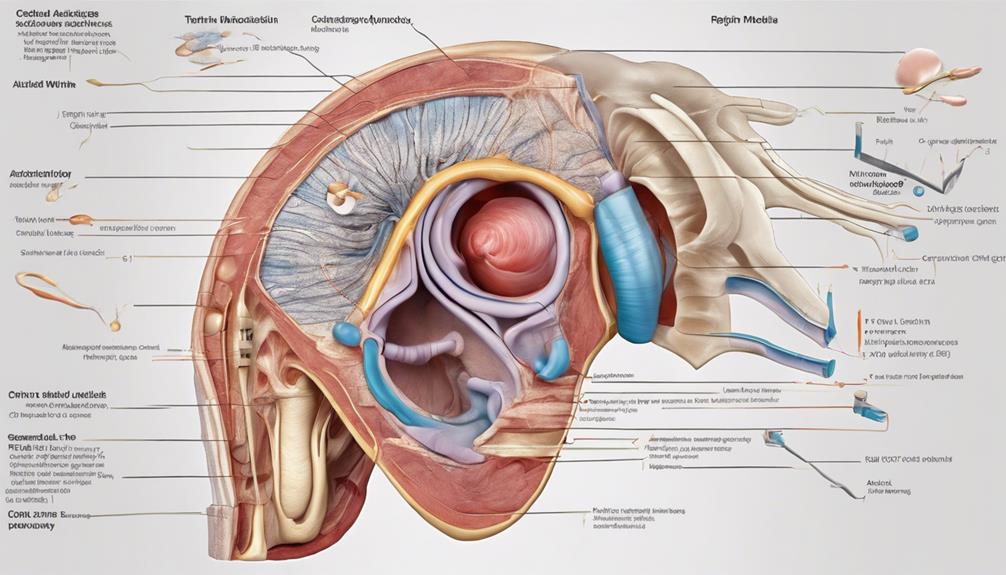
Aspirin's ototoxicity mechanisms involve its conversion to salicylic acid, potentially leading to harm in the cochlea and auditory cells, resulting in inner ear toxicity. Understanding how aspirin affects these intricate structures is vital for comprehending its potential to cause hearing loss.
The intricate interplay between aspirin and the delicate auditory components underscores the importance of being well-informed about the risks associated with its use.
Aspirin and Cochlea Damage
The conversion of aspirin to salicylic acid within the body is a critical process that underlies its potential ototoxic effects on the auditory system, particularly within the delicate structures of the cochlea.
- Salicylic acid, a metabolite of aspirin, can cause cochlear damage through its ototoxic effects on the inner ear.
- High doses of aspirin can lead to toxic effects in the cochlea, potentially resulting in hearing loss and tinnitus.
- The disruption of cochlear function by aspirin can harm the sensory cells in the inner ear, affecting hearing.
- While lower doses like 81 mg are generally safe, higher doses of aspirin may pose a concern for ototoxicity, emphasizing the importance of dosage considerations in preserving hearing health.
Effects on Auditory Cells
Damage to auditory cells in the inner ear caused by aspirin is a significant factor contributing to the development of hearing loss. High doses of aspirin can lead to ototoxicity by affecting the function of hair cells in the cochlea. Aspirin-induced ototoxicity may result from interference with the blood flow to the cochlea. The generation of free radicals due to aspirin can cause oxidative stress, harming auditory cells. Aspirin's impact on ion channels in the cochlea can disrupt normal auditory function, potentially leading to hearing loss.
| Effects on Auditory Cells | |||
|---|---|---|---|
| Aspirin-induced Ototoxicity | Hair Cells Damage | Blood Flow Interference | Free Radicals Generation |
Inner Ear Toxicity
Inner ear toxicity from aspirin, resulting from its conversion to salicylic acid, intricately disrupts cochlear function.
- Salicylic acid, a metabolite of aspirin, can reach high levels in the inner ear, contributing to toxic effects and potentially causing hearing loss.
- Aspirin's ototoxicity mechanisms primarily involve the damaging of delicate hair cells within the cochlea, significantly impacting auditory function.
- Tinnitus, a common symptom of aspirin-induced inner ear toxicity, manifests as ringing or buzzing sounds in the ears, signaling potential hearing issues.
- Recognizing the ototoxic effects of aspirin is pivotal in identifying and addressing risks associated with hearing loss, emphasizing the importance of informed decision-making regarding its use.
Aspirin and Auditory Nerve Damage
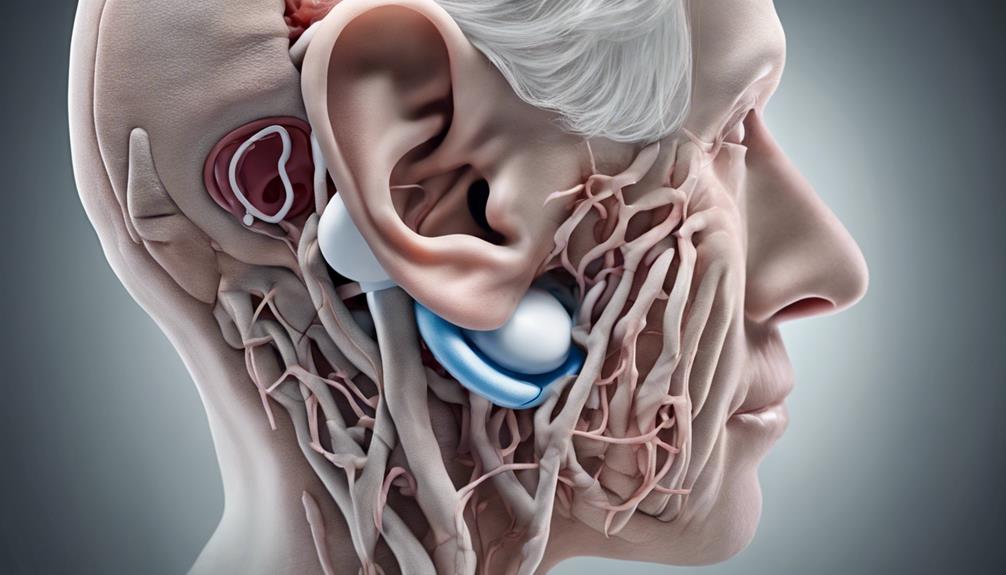
When aspirin metabolizes into salicylic acid in the body, it can lead to potential toxic effects on hearing, including damage to the auditory nerve. The conversion of aspirin to salicylic acid is a crucial step that can contribute to the development of hearing issues. Excessive levels of aspirin in the body have been associated with auditory nerve damage, which may result in hearing loss. However, it is essential to note that at lower doses, such as the commonly recommended 81-mg dose, aspirin is not typically a significant risk factor for hearing loss.
To provide a clearer overview, the table below summarizes key points related to aspirin and auditory nerve damage:
| Aspirin and Auditory Nerve Damage |
|---|
| Aspirin metabolism to salicylic acid |
| Potential toxic effects on hearing |
| Damage to the auditory nerve |
| Excessive aspirin levels and hearing loss |
| Lower dose (81-mg) and minimal risk |
Salicylate-Induced Tinnitus

Experiencing salicylate-induced tinnitus can be a common consequence of high doses of aspirin or salicylate medications. When salicylate levels rise due to excessive intake of aspirin or medications containing salicylates, the auditory system can be affected, leading to symptoms such as ringing, buzzing, or hissing sounds in the ears.
Here are four key points to consider regarding salicylate-induced tinnitus:
- Reversible Effect: Salicylate-induced tinnitus may be reversible upon discontinuation of aspirin or salicylate-containing drugs. By reducing or stopping the intake of these medications, the tinnitus symptoms can often improve or disappear entirely.
- Symptom Manifestation: Tinnitus from salicylate can manifest in various ways, including different types of sounds perceived in the ears. Recognizing these manifestations can aid in early detection and management of the condition.
- Mechanism of Action: The mechanism behind salicylate-induced tinnitus involves alterations in neurotransmission within the auditory system. Understanding these changes is crucial in developing targeted interventions for individuals affected by this condition.
- Monitoring Importance: Regular monitoring for tinnitus is essential when using aspirin or salicylate medications to prevent potential hearing issues. Being aware of any auditory changes can prompt timely intervention and prevent long-term complications.
Aspirin's Role in Inner Ear Inflammation

Aspirin's role in inner ear inflammation is a critical aspect to consider when discussing potential hearing issues associated with its use.
The conversion of aspirin to salicylic acid can trigger an inflammatory response in the inner ear, impacting cochlear function and auditory perception.
Understanding how aspirin contributes to inner ear inflammation is essential for managing the potential risks of hearing loss and tinnitus.
Inner Ear Inflammation Causes
Inhibiting the enzyme cyclooxygenase can lead to inner ear inflammation caused by aspirin, triggering a cascade of inflammatory responses within the cochlea.
- Disruption of Cochlear Blood Flow: Inflammatory mediators released due to aspirin's action can disturb the intricate network of blood vessels in the cochlea, affecting oxygen and nutrient supply to the inner ear structures.
- Impact on Sensory Cells: Inner ear inflammation induced by aspirin may lead to changes in cochlear blood flow and oxygen levels, jeopardizing the health and function of sensory cells responsible for hearing.
- Oxidative Stress and Damage: Aspirin's role in inner ear inflammation can instigate oxidative stress, potentially causing harm to delicate hair cells and neurons crucial for auditory signal transmission.
- Contribution to Hearing Loss: The inflammatory processes initiated by aspirin can play a pivotal role in the development of both temporary and permanent hearing impairments via various mechanisms in the inner ear.
Aspirin's Inflammatory Impact
With the potential for inner ear inflammation caused by aspirin, understanding the inflammatory impact of this medication on the cochlea is crucial in evaluating its role in hearing loss.
Aspirin's conversion to salicylic acid in the body can trigger inner ear inflammation, which, in turn, may contribute to cochlear damage and subsequent hearing loss. This inflammatory impact can specifically affect crucial components like hair cells and auditory nerve function within the cochlea.
Furthermore, chronic aspirin use might worsen inflammatory processes in the inner ear, potentially exacerbating hearing issues. Recognizing the link between aspirin-induced inner ear inflammation and hearing loss sheds light on a significant mechanism through which aspirin may adversely affect auditory health.
Aspirin's Effect on Vestibular Function
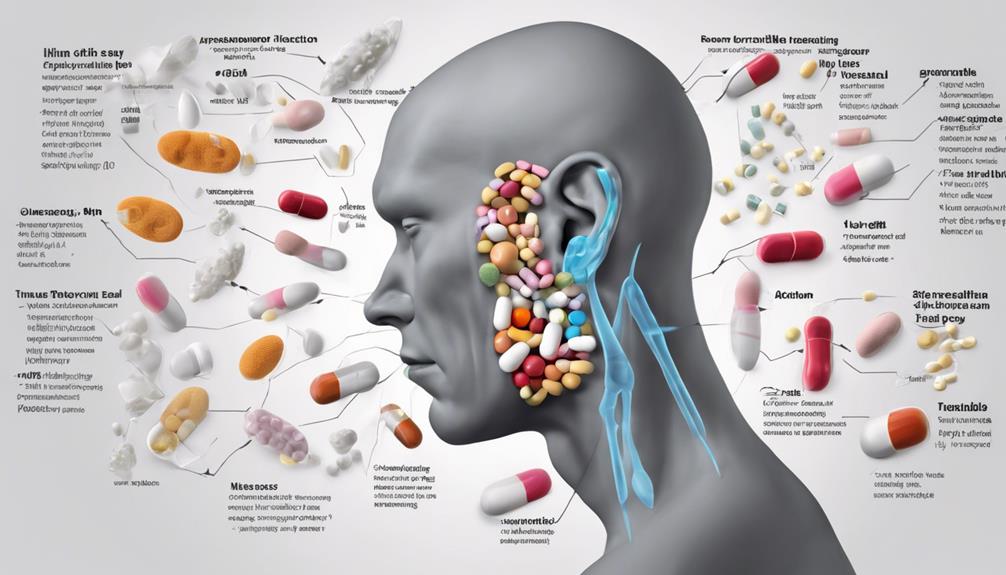
How does aspirin impact the vestibular function in the inner ear?
Aspirin can disrupt the delicate balance mechanism within the inner ear, leading to potential issues with the vestibular function. Here are four key points to consider:
- Vertigo and Dizziness: High doses of aspirin have been linked to vertigo, dizziness, and imbalance. These symptoms arise from the interference of aspirin with the vestibular system, affecting one's sense of equilibrium.
- Unsteadiness and Spinning Sensations: Aspirin-induced changes in vestibular function can cause feelings of spinning or unsteadiness. This disruption can significantly impact an individual's quality of life and daily activities.
- Reversibility: The vestibular side effects triggered by aspirin are typically reversible upon discontinuation of the medication. Ceasing aspirin use can help restore normal vestibular function over time.
- Monitoring and Awareness: It's crucial for individuals taking high doses of aspirin to be vigilant for signs of vestibular dysfunction. Regular monitoring and awareness of any changes in balance or dizziness can prompt timely intervention and management strategies.
Aspirin and Synaptic Transmission in the Auditory Pathway
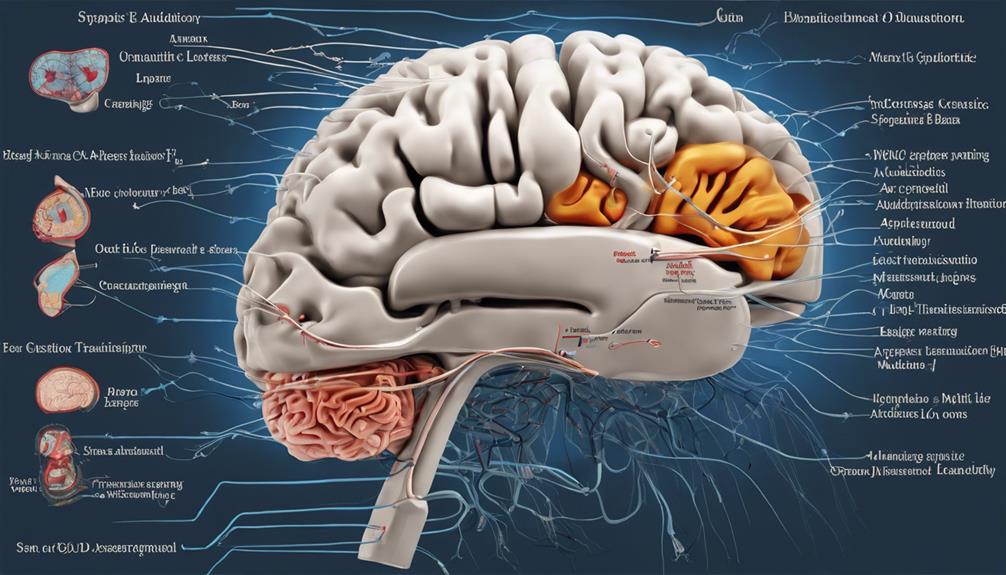
By modulating neurotransmitter release and receptor function, aspirin exerts an influence on synaptic transmission within the auditory pathway, potentially impacting neural communication. Aspirin's effects on synaptic transmission in the auditory pathway involve alterations in glutamate and GABA signaling, key neurotransmitters in auditory processing. These changes can disrupt the delicate balance of excitation and inhibition necessary for proper neural function in hearing.
Additionally, aspirin's impact on synaptic plasticity can lead to modifications in the strength of connections between auditory neurons, affecting signal processing along the auditory pathway.
The disruption of synaptic transmission by aspirin is a critical factor in understanding how this medication may contribute to hearing loss. Changes in synaptic function can lead to deficits in auditory processing and perception, potentially manifesting as hearing difficulties over time. Investigating the specific mechanisms through which aspirin influences synaptic transmission in the auditory pathway is essential for unraveling its role in the development of hearing impairments.
Aspirin-Related Changes in Auditory Brainstem Response

Aspirin's impact on auditory function extends to altering auditory brainstem response (ABR) patterns, indicating potential disruptions in neural responses to auditory stimuli. When considering aspirin-related changes in ABR, several key points come to light:
- Aspirin can lead to modifications in ABR waveforms, suggesting disturbances in auditory processing linked to aspirin exposure.
- These alterations in ABR patterns may signify central auditory system dysfunction, highlighting the broader impact of aspirin on auditory pathways.
- Abnormalities in ABR readings due to aspirin usage may reflect underlying shifts in auditory nerve function, contributing to auditory processing issues.
- Monitoring changes in ABR provides valuable insights into the effects of aspirin on the integrity of the auditory pathway, aiding in the early detection of potential central auditory system dysfunction.
Understanding how aspirin influences auditory brainstem response is crucial in comprehending the mechanisms through which aspirin may contribute to hearing loss, paving the way for targeted interventions to mitigate central auditory system dysfunction.
Aspirin's Influence on Hair Cell Function

Interfering with the delicate function of hair cells in the inner ear, aspirin poses a potential risk for hearing loss. The inner ear contains tiny hair cells responsible for converting sound vibrations into electrical signals that the brain can interpret as sound. When aspirin levels in the body are high, these crucial hair cells may be adversely affected, leading to hearing problems such as tinnitus and potential hearing loss.
To better understand the impact of aspirin on hair cell function, it is essential to delve into the specifics. The table below outlines key points regarding aspirin's influence on hair cells in the inner ear:
| Aspect | Details |
|---|---|
| Effect on hair cells | Aspirin can interfere with the function of hair cells in the inner ear. |
| Toxic effects | High levels of aspirin in the body can have toxic effects on the delicate hair cells. |
| Hearing problems | Aspirin's impact on hair cell function may contribute to the development of tinnitus. |
| Standard dose safety | At a standard dose of 81 mg, aspirin is not linked to a significant risk of hearing loss. |
| Importance of understanding | Understanding how aspirin affects hair cell function is crucial in assessing hearing loss. |
Aspirin Dosage and Hearing Loss Risk

With aspirin dosage playing a critical role in the risk of hearing loss, understanding the impact of varying levels on auditory health is imperative for informed decision-making.
- Standard Dose Safety: The standard 81-mg dose of aspirin commonly used for cardiovascular benefits doesn't pose a risk of hearing loss.
- Toxic Effects: High levels of aspirin can lead to toxic effects in the body, potentially resulting in tinnitus and hearing loss.
- Elevated Risk: Tinnitus and hearing loss are potential side effects associated with aspirin levels exceeding the recommended dosage.
- Salicylic Acid Impact: The conversion of aspirin to salicylic acid in the body plays a role in its impact on hearing health.
It is essential to be cautious with aspirin intake, especially at higher doses beyond the usual daily recommendation, to mitigate the risk of hearing loss and related issues. Understanding the relationship between aspirin dosage and hearing health can aid in making informed choices regarding medication use.
Frequently Asked Questions
How Can Aspirin Cause Hearing Loss?
Aspirin can cause hearing loss by converting to salicylic acid in the body, which can have toxic effects on hearing at high levels. Potential side effects of aspirin include tinnitus and hearing loss, particularly at higher doses and with prolonged usage.
At the standard 81-milligram dose, there's no risk of hearing loss. It's important to be aware of these potential effects and consult a healthcare provider if concerned about aspirin's impact on hearing.
How Long Does Aspirin Induced Tinnitus Last?
Aspirin-induced tinnitus duration varies, influenced by factors like dosage and individual sensitivity. It can persist from hours to weeks after stopping aspirin. Monitoring post-discontinuation tinnitus helps determine if further steps are needed.
Seeking medical advice if tinnitus lingers is crucial for proper evaluation. Understanding the potential duration of aspirin-induced tinnitus can guide appropriate interventions. Consulting a healthcare provider for persistent symptoms is essential for comprehensive management.
Can Hearing Loss From Medication Be Reversed?
Yes, medication-induced hearing loss can sometimes be reversed depending on various factors like the drug type, dosage, and individual response.
Prompt discontinuation of the ototoxic medication can increase the chances of reversing drug-induced hearing loss.
Seeking early medical advice and intervention are crucial in potentially reversing hearing issues caused by medications.
Monitoring our hearing health and staying informed about ototoxic drugs can aid in early detection and management of medication-induced hearing problems.
Can Some Aspirins and Ibuprofen Medicines Cause Deafness When Taken in Huge Amounts?
Yes, high doses of aspirin and ibuprofen can potentially cause deafness. These medications, when taken in large amounts, may lead to toxic effects that harm hearing.
It's essential to be cautious with the dosage of these drugs to prevent adverse effects on auditory function. Monitoring intake and consulting healthcare professionals can help mitigate the risk of hearing loss associated with excessive aspirin and ibuprofen consumption.
Conclusion
In conclusion, it's crucial to understand the potential risks of aspirin-induced hearing loss and stay informed about the mechanisms at play.
By being aware of how aspirin can impact cochlear blood flow, nerve damage, and inner ear inflammation, individuals can make informed decisions about their medication usage.
Remember, knowledge is power when it comes to protecting your hearing health.
Stay informed, stay proactive, and prioritize your auditory well-being.
Taylor brings a dynamic and analytical perspective to the Deaf Vibes team, focusing on research-driven content that educates and informs. With an unquenchable curiosity for new developments, policies, and social issues affecting the deaf and hard-of-hearing community, Taylor’s writing is a crucial resource for readers seeking to navigate these areas. Whether breaking down legal rights, highlighting educational opportunities, or offering guides on accessible technology, Taylor’s work is an invaluable asset to those seeking to empower themselves and others. Taylor’s commitment to accuracy and depth ensures that our readers have access to reliable and actionable information.
Understanding Hearing Loss
How Dog Barking Can Cause Hearing Loss: Prevention Tips
Bark up the right tree with prevention tips for protecting your dog's hearing from excessive barking – your furry friend's health may depend on it!

Have you ever thought about the possibility that dog barking might be connected to hearing loss in our furry friends?
The impact of loud noises on dogs' hearing is a topic that deserves attention, especially when it comes to our beloved pets.
Understanding how excessive barking can contribute to hearing damage is just the beginning of a crucial conversation that can help us protect our dogs' well-being.
Let's explore practical prevention tips that can make a significant difference in safeguarding their hearing health.
Key Takeaways
- Dog barks reaching 95-100 dB can harm hearing.
- Factors like distance, pitch, and energy impact hearing.
- Protection from loud barking is crucial for hearing health.
- Hyperacusis can exacerbate damage from loud noises.
Understanding the Impact of Dog Barking
Understanding the impact of dog barking on our hearing is crucial for safeguarding our auditory health and well-being. Dog barks can be surprisingly loud, reaching 95-100 dB, levels that have the potential to cause hearing damage in humans. The higher frequencies present in dog barks carry significant energy that can harm the delicate receptors in our inner ear.
While damage from sudden loud sounds like dog barks is typically immediate, it may not always be permanent, especially if exposure is from short bursts. Factors such as distance from the dog, existing ear health, pitch of the bark, and the overall energy of the sound all play a role in determining the impact of dog barking on our hearing.
It's essential to be aware that hyperacusis and individual sensitivity can exacerbate the damage caused by loud dog barks, making it even more important to take steps to protect our ears from excessive noise exposure.
Signs of Hearing Damage in Dogs

Experiencing hearing loss in dogs can manifest through various signs that pet owners should be attentive to, such as a lack of response to sounds, head tilting, or increased barking. Changes in behavior, like heightened startle responses or sleeping through loud noises, can also indicate hearing loss in dogs.
Ear infections, head trauma, or aging are common contributors to hearing damage in dogs, potentially leading to a loss of responsiveness to auditory cues. Additionally, dogs with hearing loss may display confusion, anxiety, or difficulty locating the source of sounds in their environment.
Monitoring your dog's response to sounds and scheduling regular veterinary check-ups are essential in detecting early signs of hearing damage. Being aware of these signs and seeking prompt attention from a veterinarian can help in managing your dog's hearing health effectively.
Managing Noise Exposure at Home
To create a quieter living space and protect your dog's hearing, consider soundproofing windows and doors at home. This can help minimize the impact of loud sounds, such as dog barking, on your hearing health. Additionally, using white noise machines or earplugs can further reduce the effects of loud noises in your environment.
When managing noise exposure at home, it's crucial to prioritize hearing protection for both yourself and your furry companion. Here are three practical tips to help you create a quieter environment:
- Install soundproofing materials on windows and doors to reduce external noise levels.
- Use white noise machines or earplugs to mask loud sounds and create a more peaceful atmosphere.
- Establish boundaries with neighbors regarding acceptable noise levels to prevent prolonged exposure to loud noises.
Training Techniques for Quieter Behavior

When addressing excessive barking behavior in dogs, training them to respond to quiet commands is an effective way to promote a calmer environment at home. Positive reinforcement techniques, such as rewarding calm behavior, can encourage quieter responses. Consistent training sessions focusing on quiet behavior can help establish desired habits, preventing damage to delicate hair cells in the ears caused by high-pitched barking. Teaching alternative behaviors, like fetching a toy instead of barking, can redirect attention effectively. Professional trainers can also provide guidance on effective techniques for reducing barking, ensuring the well-being of both your pet and your household environment.
| Training Techniques for Quieter Behavior | Benefits |
|---|---|
| Positive Reinforcement | Encourages calm responses |
| Consistent Training Sessions | Establishes desired habits |
| Teaching Alternative Behaviors | Redirection of attention |
| Professional Guidance | Effective barking reduction techniques |
Seeking Professional Help and Solutions
To address excessive barking behavior in dogs effectively, seeking professional guidance and solutions is paramount for ensuring the well-being of both your pet and your household environment. When dealing with potential hearing issues caused by noise exposure, consulting audiologists or ENT specialists can provide valuable insights into the extent of damage in the middle ear. These professionals can offer comprehensive evaluations and recommend suitable treatment options to address conditions like tinnitus and hyperacusis, which can result from prolonged exposure to loud barking.
Early intervention is key to preventing further deterioration in hearing health. Additionally, lifestyle modifications such as reducing your dog's exposure to loud noises can help manage these conditions effectively. Support groups and online forums can also be beneficial resources for individuals navigating the challenges of hearing problems caused by excessive dog barking. Remember, taking proactive steps and seeking professional help are crucial in safeguarding both your and your pet's auditory well-being.
Frequently Asked Questions
Can Dog Barking Make You Lose Hearing?
Yes, exposure to loud dog barking can lead to hearing loss. The high decibel levels and energy in the barks can harm inner ear receptors, potentially causing issues.
Factors like distance and existing ear health play a role in the extent of damage. Individuals with hyperacusis may be more sensitive to loud barking.
Protecting your ears with ear protection and supplements can help reduce the impact on your hearing health.
How Can I Prevent My Dogs Hearing Loss?
We can prevent our dogs' hearing loss by being mindful of loud noises and providing them with a safe environment. Avoid exposing them to loud activities like fireworks and construction.
Create a quiet space at home for them to retreat to. Consider using ear protection for dogs during noisy events. Training tools like SpotOn collars can help communicate with dogs without risking their hearing health.
Prioritize your furry friend's well-being by taking these precautions.
How Can I Prevent Further Hearing Loss?
To prevent further hearing loss, we recommend using ear protection, like earplugs or earmuffs, in noisy environments. Soundproofing windows and doors can also help create a quieter space.
Limiting exposure to loud sounds, such as barking dogs, is crucial. Seeking advice from audiologists or ENT specialists for managing symptoms is wise.
Open communication with family about noise sensitivity is key to avoiding further hearing issues.
How Can I Reverse Hearing Loss Naturally?
We can improve hearing naturally by focusing on lifestyle changes. Consuming nutrients like magnesium and vitamins A, C, and E, along with regular exercise, can benefit ear health. Avoiding loud noises and using ear protection help prevent further damage. Good ear hygiene and medical advice for underlying conditions are crucial.
Engaging in activities that boost blood circulation, such as yoga or massage, may alleviate hearing loss.
Conclusion
In conclusion, just as a symphony conductor carefully keeps the orchestra in tune, we must orchestrate a harmonious environment for our furry companions.
By heeding the warning signs and taking proactive steps to reduce noise exposure, we can safeguard our dogs' delicate ears like precious musical instruments.
Let's tune into their needs and create a serene melody of safety and well-being for our beloved pets.
Taylor brings a dynamic and analytical perspective to the Deaf Vibes team, focusing on research-driven content that educates and informs. With an unquenchable curiosity for new developments, policies, and social issues affecting the deaf and hard-of-hearing community, Taylor’s writing is a crucial resource for readers seeking to navigate these areas. Whether breaking down legal rights, highlighting educational opportunities, or offering guides on accessible technology, Taylor’s work is an invaluable asset to those seeking to empower themselves and others. Taylor’s commitment to accuracy and depth ensures that our readers have access to reliable and actionable information.
Understanding Hearing Loss
How Stress Can Cause Hearing Loss in One Ear
Prepare to be amazed as we unravel the mysterious link between stress and hearing loss in one ear, revealing surprising insights that may change how you perceive stress's impact on your health.

Let’s be honest; stress is an inevitable aspect of contemporary living, but were you aware that it could be quietly impacting your hearing, particularly in one ear?
The impact of stress on our physical well-being goes beyond just mental strain. As we navigate the complexities of daily stressors, our ears might be bearing the brunt of it in ways we least expect.
So, how exactly does stress lead to hearing loss in one ear? Stay tuned to uncover the surprising connection between stress and unilateral hearing impairment, and discover what steps you can take to protect your precious sense of sound.
Key Takeaways
- Chronic stress reduces blood flow to one ear, affecting oxygen supply to hearing structures.
- Asymmetrical hearing abilities from stress impact sound localization.
- Stress can damage inner ear hair cells in one ear, disrupting sound transmission.
- Early intervention is crucial to preserve hearing health in cases of stress-induced unilateral hearing loss.
Understanding the Impact of Stress on Hearing
Chronic stress significantly impacts hearing by reducing blood flow to the ears, affecting the delicate ear cells responsible for auditory function. The inner ear, with its fragile hair cells, requires consistent blood circulation for optimal hearing ability. When stress disrupts this vital blood flow, it can lead to symptoms like pain, pressure, or muffled sounds in one ear, indicating potential stress-induced hearing loss. The intricate network of blood vessels in the inner ear can suffer damage from stress-related hypertension, further compromising hearing in one ear.
Managing stress is paramount in preventing or mitigating stress-induced hearing loss in one ear. By implementing effective stress management techniques such as mindfulness, exercise, or therapy, individuals can safeguard their hearing health. Understanding the intricate relationship between stress and hearing is crucial for maintaining overall well-being. It underscores the importance of proactive stress management to preserve the delicate mechanisms of hearing and prevent potential unilateral hearing impairments.
Mechanisms of Unilateral Hearing Loss

The onset of unilateral hearing loss can be attributed to a variety of factors, with stress emerging as a significant contributor to this condition. When stress levels affect blood circulation, it can reduce blood flow to a specific ear, leading to decreased oxygen and nutrient supply to the delicate structures responsible for hearing.
This impact on the inner ear can result in asymmetrical hearing abilities, affecting sound localization and overall auditory perception. Stress-induced damage to the inner ear hair cells in one ear can disrupt the transmission of sound signals to the brain, causing unilateral hearing loss.
Understanding these mechanisms is crucial for early intervention to preserve hearing health. By addressing stress levels and their impact on blood circulation in the context of hearing loss, individuals can potentially mitigate the risk of unilateral hearing impairment and take appropriate steps to maintain their auditory well-being.
Stress-Related Damage to Inner Ear
Stress can negatively impact the inner ear by reducing blood flow, potentially leading to damage in delicate ear cells and gradual hearing loss in one ear. The inner ear's intricate system of hair cells relies on a consistent blood supply to function optimally. However, chronic stress can disrupt this process by causing stress-induced circulation issues, affecting the fragile ear cells responsible for translating sound waves into electrical signals.
The overproduction of adrenaline, a common response to stress, can further impede the circulation of blood to the ears, ultimately impacting hearing abilities. Additionally, stress-induced hypertension, often linked to prolonged periods of stress, can harm blood vessels throughout the body, including those in the inner ear. This damage can contribute to hearing loss in one ear over time.
Understanding the connection between stress and the inner ear is crucial in managing potential hearing issues that may arise from prolonged or elevated stress levels.
Strategies to Manage Stress-Induced Hearing Loss

Implementing relaxation techniques, such as deep breathing exercises, can effectively aid in managing hearing loss induced by stress. When it comes to combating stress-induced hearing loss, incorporating self-care practices into your daily routine is vital. Here are three strategies to help manage stress-induced hearing loss:
- Meditation and Yoga: Engaging in activities like meditation or yoga can promote relaxation, reduce stress levels, and improve blood flow to the ears, which is crucial for maintaining optimal hearing health.
- Regular Exercise: Physical activity not only helps in managing stress but also contributes to overall well-being. Exercise promotes blood circulation throughout the body, including the ears, supporting their health and function.
- Maintaining a Positive Mindset: Cultivating a positive outlook can play a significant role in managing stress-induced hearing loss. Positive thinking can reduce stress levels, enhance resilience, and improve the body's ability to cope with challenges, ultimately benefiting hearing health.
Seeking Professional Help for Unilateral Hearing Loss
Upon experiencing unilateral hearing loss, seeking professional assistance from a hearing healthcare provider is imperative for accurate diagnosis and tailored treatment.
Unilateral hearing loss, affecting one ear, can significantly impact sound perception and daily functioning. A hearing healthcare professional can conduct comprehensive tests to determine the cause and extent of the hearing loss.
These professionals are equipped to provide various treatment options, including hearing aids, assistive devices, or other interventions tailored to individual needs. Early intervention plays a crucial role in managing unilateral hearing loss, as it can improve the quality of life and prevent further complications.
Frequently Asked Questions
Why Have I Suddenly Gone Deaf in One Ear?
We suddenly lose hearing in one ear due to various factors like infections, trauma, or issues in the inner ear. Seeking prompt medical care is crucial to determine the cause and explore treatment options.
It's essential to address sudden hearing loss promptly to prevent potential long-term consequences. If you experience sudden deafness in one ear, don't hesitate to seek professional help for a thorough evaluation and appropriate management.
What Is the Most Common Cause of Hearing Loss in One Ear?
The most common cause of hearing loss in one ear is sudden sensorineural hearing loss (SSNHL). It can result from various factors such as viral infections, autoimmune diseases, inner ear issues, or vascular problems.
Seeking immediate medical attention is crucial when experiencing sudden hearing loss in one ear to determine the cause and explore treatment options. If left untreated, SSNHL can lead to permanent hearing loss.
Treatment may involve steroids, antiviral medications, or other interventions depending on the underlying cause.
Why Is My Hearing Suddenly Muffled in One Ear?
Feeling puzzled by sudden muffled hearing in one ear? It could be stress-related changes in blood flow impacting your hearing. Stress can cause disruptions in circulation, affecting the delicate inner ear hair cells and leading to temporary or permanent hearing loss in one ear.
If you're experiencing this, seeking professional evaluation is crucial to determine the root cause. Stress might be playing a role in that unexpected change in your hearing.
Can Hearing Loss From Stress Be Reversed?
Yes, stress-induced hearing loss can often be reversed through proper management. Seeking early professional help boosts the likelihood of reversing stress-related hearing loss.
Techniques like stress management, hearing aids, and counseling can aid in this process. Reversibility hinges on the extent of damage and individual response to interventions.
Timely intervention and tailored care are vital for potentially reversing stress-induced hearing loss.
Conclusion
In conclusion, we've explored how chronic stress can lead to hearing loss in one ear. By understanding the impact of stress on our hearing health and the mechanisms behind unilateral hearing loss, we can take proactive steps to manage stress and preserve our hearing abilities.
It's crucial to prioritize self-care and seek professional help if experiencing symptoms of stress-induced hearing loss. Remember, a healthy mind and body go hand in hand for overall well-being.
Taylor brings a dynamic and analytical perspective to the Deaf Vibes team, focusing on research-driven content that educates and informs. With an unquenchable curiosity for new developments, policies, and social issues affecting the deaf and hard-of-hearing community, Taylor’s writing is a crucial resource for readers seeking to navigate these areas. Whether breaking down legal rights, highlighting educational opportunities, or offering guides on accessible technology, Taylor’s work is an invaluable asset to those seeking to empower themselves and others. Taylor’s commitment to accuracy and depth ensures that our readers have access to reliable and actionable information.
-
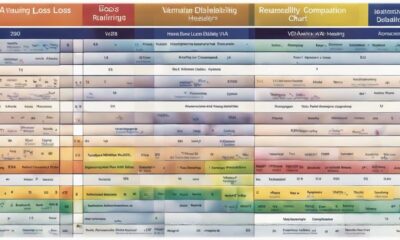
 Navigating the VA System3 weeks ago
Navigating the VA System3 weeks agoVA Hearing Loss Rating Chart: Understanding Disability Compensation
-

 Vetted4 weeks ago
Vetted4 weeks ago15 Best Oticon Hearing Aids to Improve Your Hearing in 2024
-

 Sign Language2 months ago
Sign Language2 months agoMastering the Art of Signing Letters in Sign Language
-

 Therapies and Interventions2 months ago
Therapies and Interventions2 months ago10 Auditory Processing Goals for Effective Speech Therapy
-

 Sign Language2 months ago
Sign Language2 months agoSign Language Emoji Translator: How to Communicate With Gestures
-

 Navigating the VA System2 weeks ago
Navigating the VA System2 weeks agoUnderstanding Bilateral Hearing Loss VA Rating Criteria
-

 Sign Language2 months ago
Sign Language2 months agoMedical Sign Language PDF: A Comprehensive How-To Guide
-

 Hearing Aids2 months ago
Hearing Aids2 months agoWhat Are High Frequency Hearing Loss Hearing Aids?


